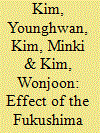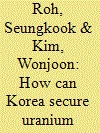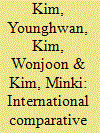|
|
|
Sort Order |
|
|
|
Items / Page
|
|
|
|
|
|
|
| Srl | Item |
| 1 |
ID:
125584


|
|
|
|
|
| Publication |
2013.
|
| Summary/Abstract |
The Fukushima nuclear disaster has significantly changed public attitudes toward nuclear energy. It is important to understand how this change has occurred in different countries before the global community revises existing nuclear policies. This study examines the effect of the Fukushima disaster on public acceptance of nuclear energy in 42 countries. We find that the operational experience of nuclear power generation which has significantly affected positive public opinion about nuclear energy became considerably negative after the disaster, suggesting fundamental changes in public acceptance regardless of the level of acceptance before the disaster. In addition, contrary to our expectation, the proportion of nuclear power generation is positively and significantly related to public acceptance of nuclear energy after the Fukushima accident and government pressure on media content led to a greater decrease in the level of public acceptance after the accident. Nuclear energy policymakers should consider the varied factors affecting public acceptance of nuclear energy in each country depending on its historical, environmental, and geographical circumstances before they revise nuclear policy in response to the Fukushima accident.
|
|
|
|
|
|
|
|
|
|
|
|
|
|
|
|
| 2 |
ID:
133092


|
|
|
|
|
| Publication |
2014.
|
| Summary/Abstract |
South Korea is heavily dependent on energy resources from other countries and nuclear energy accounts for 31% of Korea's electric power generation as a major energy. However, Korea has many limitations in uranium enrichment and spent fuel reprocessing under the current Korea-U.S. nuclear agreement, although they are economically and politically important to Korea due to a significant problems in nuclear fuel storages. Therefore, in this paper, we first examine those example countries - Japan, Vietnam, and Iran - that have made nuclear agreements with the U.S. or have changed their agreements to allow the enrichment of uranium and the reprocessing of spent fuel. Then, we analyze those countries' nuclear energy policies and review their strategic repositioning in the relationship with the U.S. We find that a strong political stance for peaceful usage of nuclear energy including the legislation of nuclear laws as was the case of Japan. In addition, it is important for Korea to acquire advanced technological capability such as sodium-cooled fast reactor (SFR) because SFR technologies require plutonium to be used as fuel rather than uranium-235. In addition, Korea needs to leverage its position in nuclear agreement between China and the U.S. as was the case of Vietnam.
|
|
|
|
|
|
|
|
|
|
|
|
|
|
|
|
| 3 |
ID:
128010


|
|
|
|
|
| Publication |
2014.
|
| Summary/Abstract |
Across the globe, public acceptance of nuclear power is a crucial factor for governmental establishment of a nuclear energy program. Therefore, it is important to understand the determinants of public acceptance of nuclear power. This study examines the effects of knowledge, trust, risk, and benefit related factors on public acceptance of nuclear power across 19 countries. We consider three levels of public acceptance - strongly accept, reluctantly accept, and oppose - and classify countries into four groups according to the ratio of those three levels of public acceptance. Our results indicate that knowledge of nuclear inspection is more effective than trust in inspection authorities in creating stronger public acceptance among people in the countries with a high level of reluctant acceptance and a low level of strong acceptance, while trust in inspection authorities is more important than knowledge of nuclear inspection for the selection between opposition and reluctant acceptance in countries with a low level of reluctant acceptance and a high level of strong acceptance. Without grouping the countries, we found that trust in inspection authorities is crucial for the decision between opposition and reluctant acceptance. Additionally, the generation of electricity has the most positive effect on public acceptance of nuclear power.
|
|
|
|
|
|
|
|
|
|
|
|
|
|
|
|
|
|
|
|
|